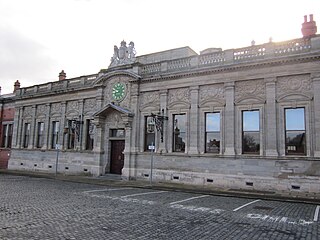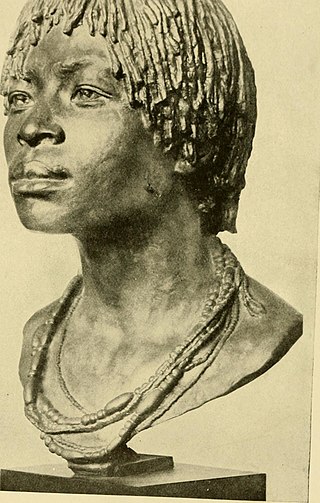Related Research Articles

Leopold II was the second King of the Belgians from 1865 to 1909,and the founder and sole owner of the Congo Free State from 1885 to 1908.

The Belgian Congo was a Belgian colony in Central Africa from 1908 until independence in 1960. The former colony adopted its present name,the Democratic Republic of the Congo (DRC),in 1964.

The Congo Free State,also known as the Independent State of the Congo,was a large state and absolute monarchy in Central Africa from 1885 to 1908. It was privately owned by and in a personal union with King Leopold II;it was not a part of,nor did it belong to,the Kingdom of Belgium,of which he was the constitutional monarch. Leopold was able to seize the region by convincing other European states at the Berlin Conference on Africa that he was involved in humanitarian and philanthropic work and would not tax trade. Via the International Association of the Congo,he was able to lay claim to most of the Congo Basin. On 29 May 1885,after the closure of the Berlin Conference,the king announced that he planned to name his possessions "the Congo Free State",an appellation which was not yet used at the Berlin Conference and which officially replaced "International Association of the Congo" on 1 August 1885. The Congo Free State operated as a separate nation from Belgium,in a personal union with its King. It was privately controlled by Leopold II,although he never personally visited the state.

Lever Brothers was a British manufacturing company founded in 1885 by two brothers:William Hesketh Lever,1st Viscount Leverhulme (1851–1925),and James Darcy Lever (1854–1916). They invested in and successfully promoted a new soap-making process invented by chemist William Hough Watson. Lever Brothers entered the United States market in 1895 and acquired Mac Fisheries,owner of T. Wall &Sons,in 1925. Lever Brothers was one of several British companies that took an interest in the welfare of its British employees. Its brands included "Lifebuoy","Lux" and "Vim". Lever Brothers merged with Margarine Unie to form Unilever in 1929.

King Leopold's Ghost:A Story of Greed,Terror and Heroism in Colonial Africa (1998) is a best-selling popular history book by Adam Hochschild that explores the exploitation of the Congo Free State by King Leopold II of Belgium between 1885 and 1908,as well as the large-scale atrocities committed during that period. The book,also a general biography of the private life of Leopold,succeeded in increasing public awareness of these crimes in recent decades.

The Kongo people are a Bantu ethnic group primarily defined as the speakers of Kikongo. Subgroups include the Beembe,Bwende,Vili,Sundi,Yombe,Dondo,Lari,and others.

The Royal Museum for Central Africa (RMCA),communicating under the name AfricaMuseum since 2018,is an ethnography and natural history museum situated in Tervuren in Flemish Brabant,Belgium,just outside Brussels. It was built to showcase King Leopold II's Congo Free State in the International Exposition of 1897.

Edmund Dene Morel was a French-born British journalist,author,pacifist and politician.

Belgium controlled several territories and concessions during the colonial era,principally the Belgian Congo from 1908 to 1960 and Ruanda-Urundi from 1922 to 1962. It also had small concessions in Guatemala (1843–1854) and in China (1902–1931) and was a co-administrator of the Tangier International Zone in Morocco.
Jan Vansina was a Belgian historian and anthropologist regarded as an authority on the history of Central Africa,especially of what is now the Democratic Republic of the Congo,Rwanda,and Burundi. He was a major innovator in the historical methodology of oral history. As a professor at the University of Wisconsin–Madison,he taught several generations of students and,according to a biographer,"set the pace in African historical studies from the 1950s into the 1990s."
The Compagnie du Kasai was a Belgian company established to exploit the resources of the Kasai River basin in the Congo Free State. At first it was mainly involved in harvesting wild rubber,but later moved into palm oil and mining.
David Starr Newbury is the Gwendolen Carter professor of African studies at Smith College,Massachusetts. He received his PhD from the University of Wisconsin–Madison in 1979 for thesis titled Kings and clans on Ijwi Island (Zaire),c. 1780-1840 under the supervision of Jan Vansina. His academic work has three major foci within East and Central Africa. The first was pre-colonial societal transformation in the Kivu Rift Valley. The second was how a Rwandan famine in the late 1920s reinforced colonial rule. The final major focus was the transformation of a hunter-gatherer society in the eastern Democratic Republic of the Congo into an agricultural economy. His recent work has included studies of the historical roots of Central African violence in the late 1990s to present. RenéLemarchand states,"No attempt to grasp the historical context of genocide [in Rwanda] can ignore Catherine [sic] and David Newbury’s seminal contributions."

The Pende people,also known as the Phende people,are an ethnic group in the south-western Democratic Republic of the Congo. The Pende are divided into two cultural groups:the Eastern Pende and the Western Pende who are distinct but consider themselves part of the same ethnic group. The Pende are divided into four regions of Western,Eastern,Kwilu,and Central. The eastern Pende may also be referred to as the “Kasai Pende”and the western referred to as the “Bandundu Pende”. Although there isn't much known about the Kwilu because of the vast diversity of ethnic groups there. The number of people who consider themselves to be ethnically Pende is estimated at over 250,000.

The International African Association was a front organization established by the guests at the Brussels Geographic Conference of 1876,an event hosted by King Leopold II of Belgium. The Association was used by King Leopold ostensibly to further his purportedly altruistic and humanitarian projects in the area of Central Africa,the area that was to become Leopold's privately controlled Congo Free State. King Leopold volunteered space in Brussels for the International African Association's headquarters,and there were to be national committees of the association set up in all the participating countries,as well as an international committee. Leopold was elected by acclamation as the international committee's first chairman,but said that he would serve for one year only so that the chairmanship could rotate among people from different countries.
Émile Lejeune is the name of:

In the period from 1885 to 1908,many atrocities were perpetrated in the Congo Free State which,at the time,was a state under the absolute rule of King Leopold II of the Belgians. These atrocities were particularly associated with the labour policies used to collect natural rubber for export. Together with epidemic disease,famine,and a falling birth rate caused by these disruptions,the atrocities contributed to a sharp decline in the Congolese population. The magnitude of the population fall over the period is disputed,with modern estimates ranging from 1.5 million to 13 million.
The Archives Africaines of the Belgian Federal Public Service Foreign Affairs in Brussels contains records related to colonial Congo Free State,Belgian Congo and Ruanda-Urundi,1885-1962. The archives was transferred in 1960 to the Ministère belge des Affaires étrangères. In 2015 the archives went to the Belgian State Archives,an arrangement expected to continue until 2018. The Archives Africaines includes "the archives of the former Ministry for Colonies,the archives of the Governor-General of the Congo,and the files on former colonial personnel ."
Huileries du Congo Belge (HCB) was a subsidiary of the soap manufacturing company Lever Brothers,created by William Hesketh Lever,which ran plantations in the Congo for the production of palm oil,using forced labour. It was established in 1911,when the soap manufacturer received a concession from the Belgian government for 750,000 hectares of forest in the Belgian Congo,mostly south of Bandundu. By 1923,a Lever soap factory was built there,and by 1924 SAVCO was established. It was the nucleus of the United Africa Company,a principal supplier to the United Kingdom of several key commodities. From 1951 it was producing Lux soap.

Congolese nationality law is the nationality law for the Democratic Republic of the Congo. It is regulated by the Constitution of the Democratic Republic of the Congo,as amended;the Congolese Nationality Code,and its revisions;the Congolese Civil Code;and various international agreements to which the country is a signatory. These laws determine who is,or is eligible to be,a national of the Democratic Republic of the Congo.

Léon Roget was a Belgian soldier and colonial administrator who was active in the Congo Free State. He was the first commander of the Force Publique,the armed force used to police the colony.
References
- ↑ Guy Vanthemsche (2006). "The historiography of Belgian colonialism in the Congo". In Csaba Lévai (ed.). Europe and the world in European historiography. PLUS-Pisa University Press. p. 103. ISBN 978-88-8492-403-2 . Retrieved 18 April 2013.
- ↑ Georges Nzongola-Ntalaja (3 May 2002). The Congo: From Leopold to Kabila: A People's History. Zed Books. p. 56. ISBN 978-1-84277-053-5 . Retrieved 18 April 2013.
- ↑ Poursuite du travail forcé après Léopold II, Toudi, nr. 42-43, december 2001-januari 2002
- ↑ Jules Marchal over dwangarbeid in Kongo, Het Belang van Limburg, 23 maart 2002
- ↑ Poursuite du travail forcé après Léopold II, Toudi, nr. 42-43, décembre-janvier 2001-2002
- ↑ Jean-Luc Vellut, Jan Vansina on the Belgian Historiography of Africa: Around the Agenda of a Bombing Raid. A Reply to 'History Facing the Present: An Interview with Jan Vansina', H-Africa, 31 januari 2002